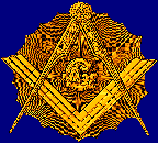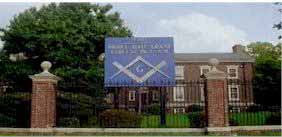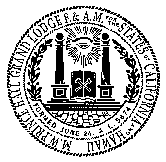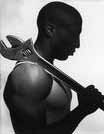Prince Hall Masons: A Historic Legacy of Making Good Men Better
 In
researching a "secret society" such as the Masons, one
In
researching a "secret society" such as the Masons, one must be aware that information on the subject may well be hard to come by. While at various times in our research we came across a number of gentlemen who were of considerable value to ourselves and our efforts, even they were restricted in what they could say on the matter. The Prince Hall Masons, or the Black Freemasons, are no different from any other such fraternal society in this respect.
The Prince Hall Masons have a proud and storied history
which is, in characteristic Mason fashion, extremely well documented.
In 1775 Prince Hall, a free black man of east Indian extraction, along
with fifteen other black men, was inducted into a lodge in Boston. The
lodge consisted primarily of members of the British Army who were stationed
in Boston. These  soldiers
were attached to the British Army as part of the 38th Regiment of Foot;
and attached to the Grand Masonic Lodge as Lodge No. 441 Irish Constitution.
The name given to these freemen's lodge after the departure of the British
in 1776 was the African Lodge No. 1. The new society there established
was one of as stringent moral value and exclusivity of character of any
other white lodge of the day. Lodge 441, prior to departure granted African
Lodge No.1 the right to meet and observe Masonic code under dispensation.
Seeking full recognition as a viable and legitimate lodge, Prince Hall
applied to the Grand Lodge of England itself on March 2, 1784. Mr.Hall
was forced to resort to appealing to a foreign lodge for a charter in
much the same way as did the largely Semitic lodges in Germany. After
repeated applications to domestic lodges, these freemen and Jews were
forced by necessity to seek recognition from a higher, and possibly more
egalitarian Grand Lodge. The petition was granted on September 29, 1784.
It was delivered to Boston on April 29, 1787 by James Scott, John Hancock's
brother-in-law and thus African Lodge No. 459 was formally
organized one week following on May 6th 1787. (Below:
The original charter; a photo and a restored versions, as well as Prince
Hall himself)
soldiers
were attached to the British Army as part of the 38th Regiment of Foot;
and attached to the Grand Masonic Lodge as Lodge No. 441 Irish Constitution.
The name given to these freemen's lodge after the departure of the British
in 1776 was the African Lodge No. 1. The new society there established
was one of as stringent moral value and exclusivity of character of any
other white lodge of the day. Lodge 441, prior to departure granted African
Lodge No.1 the right to meet and observe Masonic code under dispensation.
Seeking full recognition as a viable and legitimate lodge, Prince Hall
applied to the Grand Lodge of England itself on March 2, 1784. Mr.Hall
was forced to resort to appealing to a foreign lodge for a charter in
much the same way as did the largely Semitic lodges in Germany. After
repeated applications to domestic lodges, these freemen and Jews were
forced by necessity to seek recognition from a higher, and possibly more
egalitarian Grand Lodge. The petition was granted on September 29, 1784.
It was delivered to Boston on April 29, 1787 by James Scott, John Hancock's
brother-in-law and thus African Lodge No. 459 was formally
organized one week following on May 6th 1787. (Below:
The original charter; a photo and a restored versions, as well as Prince
Hall himself)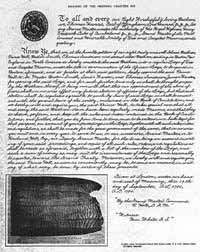
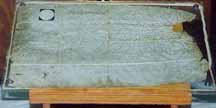

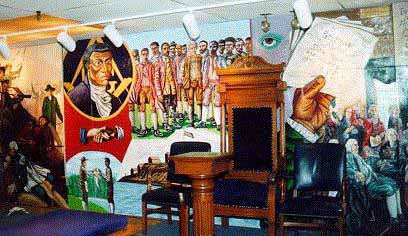 we found in both
Birmingham and Pittsburgh, are still very active. They offer men of all
nationalities the opportunity to fulfill the requirements of the order and
become a part of the society. Today the Prince Hall fraternity has over
4,500 lodges worldwide, forming forty five independent jurisdictions with
a membership of over 300,000 masons. The proceedings of Masonic meetings
are private, and many members choose to extend that secrecy to all matters
concerning the brotherhood. Masonic Temples are often landmarks in the community
and very often bear witness to the financial integrity and aesthetic sensibility
of the local black community. Freemasons are educated, God-fearing men often
of the middle-class or higher status who take an earnest interest in their
communities. The order is often involved in making anonymous donations to
worthy charities at work in their area, and in providing and invaluable
forum for social networking between one generation and the next. Very often
the Masonic rites are passed from one generation to the next. Many Masonic
temples have not seen the drop in membership that other fraternal orders
have, and it seems unlikely that the Prince Hall Masons will ever relinquish
their role in the African-American community. (Above right: Interior Grand
Lodge, Boston MA.)
we found in both
Birmingham and Pittsburgh, are still very active. They offer men of all
nationalities the opportunity to fulfill the requirements of the order and
become a part of the society. Today the Prince Hall fraternity has over
4,500 lodges worldwide, forming forty five independent jurisdictions with
a membership of over 300,000 masons. The proceedings of Masonic meetings
are private, and many members choose to extend that secrecy to all matters
concerning the brotherhood. Masonic Temples are often landmarks in the community
and very often bear witness to the financial integrity and aesthetic sensibility
of the local black community. Freemasons are educated, God-fearing men often
of the middle-class or higher status who take an earnest interest in their
communities. The order is often involved in making anonymous donations to
worthy charities at work in their area, and in providing and invaluable
forum for social networking between one generation and the next. Very often
the Masonic rites are passed from one generation to the next. Many Masonic
temples have not seen the drop in membership that other fraternal orders
have, and it seems unlikely that the Prince Hall Masons will ever relinquish
their role in the African-American community. (Above right: Interior Grand
Lodge, Boston MA.)Below: Images, seals, and symbols from various Prince Hall Lodges across the nation.

